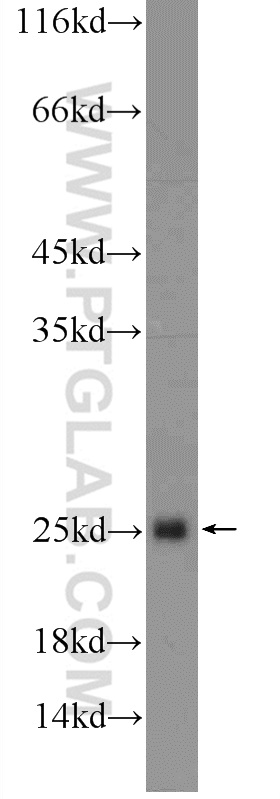验证数据展示
经过测试的应用
| Positive WB detected in | mouse liver tissue |
推荐稀释比
| Application | Dilution |
|---|---|
| Western Blot (WB) | WB : 1:200-1:1000 |
| It is recommended that this reagent should be titrated in each testing system to obtain optimal results. | |
| Sample-dependent, Check data in validation data gallery. | |
发表文章中的应用
| WB | See 3 publications below |
产品信息
20532-1-AP targets HIST1H3D in WB, ELISA applications and shows reactivity with human, mouse samples.
| Tested Applications | WB, ELISA Application Description |
| Cited Applications | WB |
| Tested Reactivity | human, mouse |
| Cited Reactivity | human, mouse |
| Immunogen | HIST1H3D fusion protein Ag14394 种属同源性预测 |
| Host / Isotype | Rabbit / IgG |
| Class | Polyclonal |
| Type | Antibody |
| Full Name | histone cluster 1, H3d |
| Synonyms | H3FC HIST1H3C, H3C6, H3C4, H3C3, H3C2 |
| Calculated Molecular Weight | 136 aa, 15 kDa |
| Observed Molecular Weight | 15-25 kDa |
| GenBank Accession Number | BC031333 |
| Gene Symbol | HIST1H3D |
| Gene ID (NCBI) | 8351 |
| RRID | AB_2811276 |
| Conjugate | Unconjugated |
| Form | Liquid |
| Purification Method | Antigen affinity purification |
| UNIPROT ID | P68431 |
| Storage Buffer | PBS with 0.02% sodium azide and 50% glycerol pH 7.3. |
| Storage Conditions | Store at -20°C. Stable for one year after shipment. Aliquoting is unnecessary for -20oC storage. |
实验方案
| Product Specific Protocols | |
|---|---|
| WB protocol for HIST1H3D antibody 20532-1-AP | Download protocol |
| Standard Protocols | |
|---|---|
| Click here to view our Standard Protocols |
发表文章
| Species | Application | Title |
|---|---|---|
Cell Res Comparison of viral RNA-host protein interactomes across pathogenic RNA viruses informs rapid antiviral drug discovery for SARS-CoV-2. | ||
Int J Biochem Cell Biol SNORA42 enhances prostate cancer cell viability, migration and EMT and is correlated with prostate cancer poor prognosis. | ||
